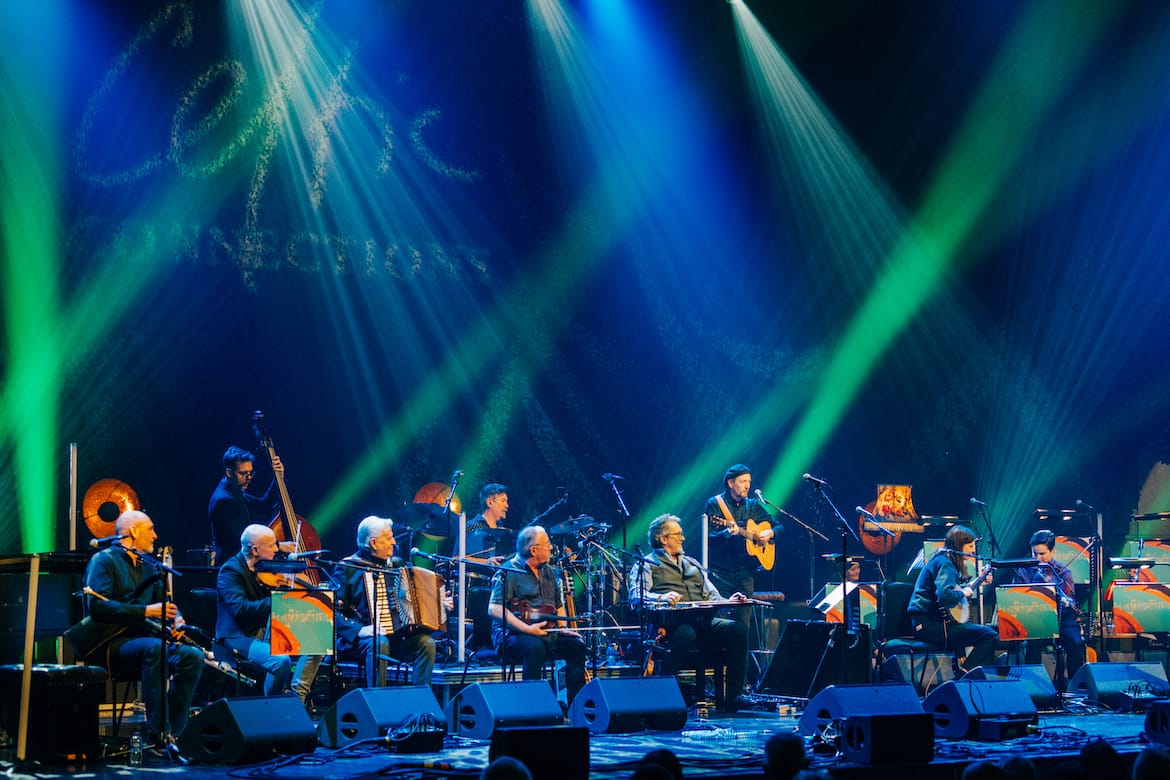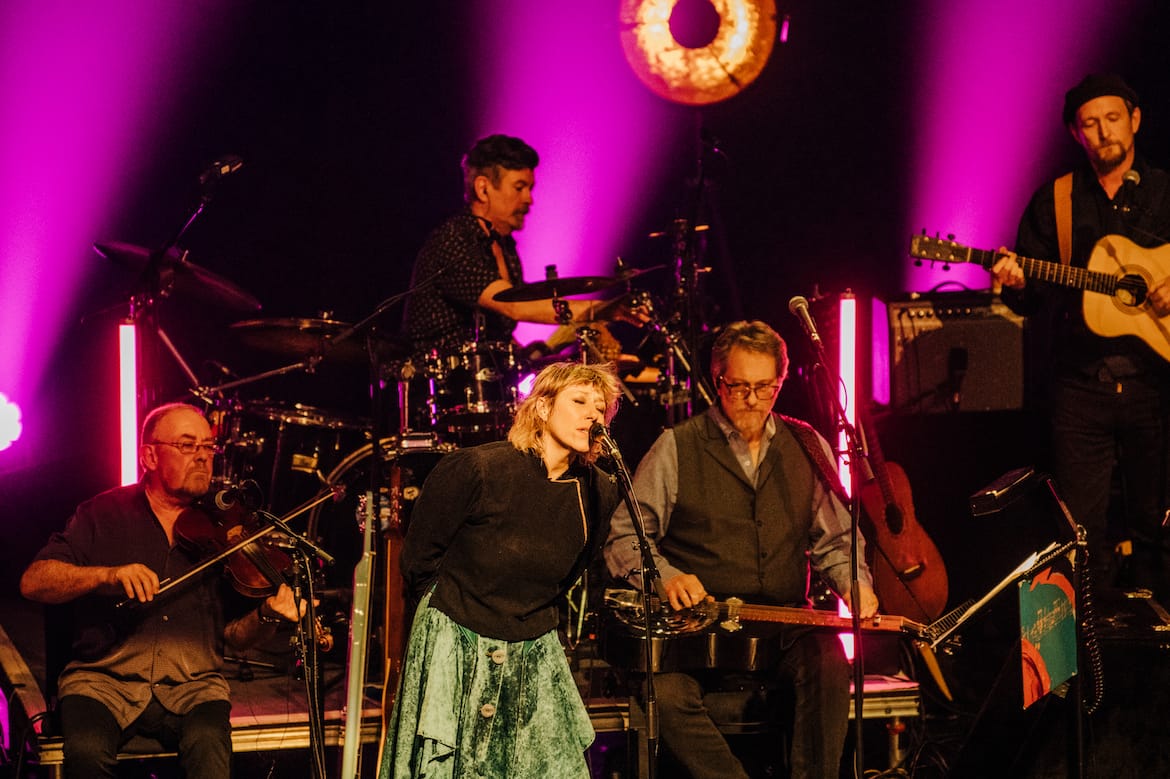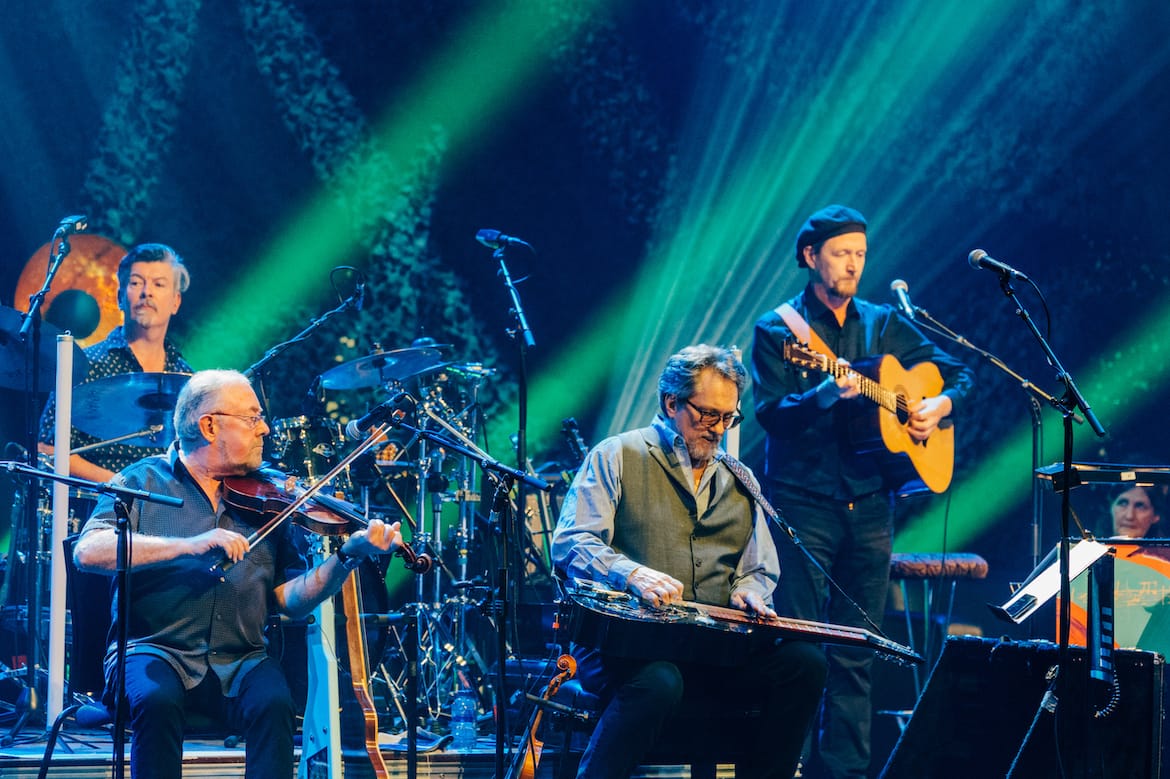While Celtic Connections was celebrating its 30th Anniversary, Transatlantic Sessions, one of the festival’s most enduring and beloved institutions, celebrated its 20th edition. Once again, the Royal Concert Hall in Glasgow was full, some no doubt coming to see the better-known guests like Martha Wainwright or Hothouse Flowers frontman Liam Ó Maonlai, but you sense that most of the crowd come regardless of the names, wanting to soak up the whole assortment of tunes, songs and genres.
After the bustling Waiting For The Federals, the obligatory opening theme tune from the house band, first guest Amythyst Kiah took to the stage to sing Firewater from her acclaimed 2021 release Wary + Strange. A melancholy song that was inspired by revisiting old haunts and missing the nostalgia of her earlier ‘party years’ but also not missing that cyclical part of her life (she talks about the song here); she sings in an appropriately understated way, playing countryfied electric guitar, with notable support from Aly Bain and John McCusker on fiddle and Michael McGoldrick on whistle. She followed that, much more in the kind of territory of the music she recorded with Rhiannon Giddens, Leyla McCalla and Allison Russell on the wonderful Songs of Our Native Daughters album, with the Appalachian staple Darlin Corey, playing an amazingly full banjo sound and a much more forceful vocal. In the second half, Amythyst returned to play two more songs from her album, a bluesy rocking Fracture Me and Wild Turkey, which powerfully portrays her trauma about the death of her mother when she was 17 – it’s very raw, her suffering unconcealed.

The old-time American duo made up of banjo player Allison de Groot and fiddle player Tatiana Hargreaves supplemented the house band and played a couple of tunes on their own; one Wellington, written by Alison, had an intriguing fiddle part, very effectively melding in something of a classical motif, and sang Banks of The Mirimachi, an old Canadian song, with a quirky tune, which they told us ‘warns against using natural resources for commercial gain’. The audience always give house band member John Doyle a heartfelt welcome when he performs his usual one song, this year he gave us Tunnel Tigers, a song about, mainly Irish, labourers digging the tunnels for the Underground out of the London clay, which he learnt from one of ‘his heroes’, Ewan MacColl. As amiable and engaging as ever, John taught the audience the chorus in no time, creating a happy majority backing choir.
Liam Ó Maonlai brought a wholly different energy and feel to proceedings – shifting the gear and delighting the audience. Having heard him play a support slot singing mainly Gaelic songs a few days before, it was a surprise to hear him sing and play piano on two decidedly jazz-orientated numbers in the first half. The first, Strange Feeling, with band members Daniel Kimbro on double bass and James Mackintosh on drums, had all the smoky, bluesy drive of a Mose Allison number; the second, a fetching rendition of Work Song, written by jazz cornet player Nat Adderley. In the second half, Liam sang Worry Not, a song he said was ‘for anybody who worries a lot’, with something of a Dylan-esque delivery, and getting the audience to sing along, and a Gaelic song Cathain, Liam standing and playing the bodhran (which he also did with the house band on a lot of tunes), with fine vocal support from with Karen Matheson and from Michael McGoldrick on flute.

An artist of Martha Wainwright’s stature undoubtedly deserves to be introduced in a way other than as the daughter of famous parents Kate McGarrigle and Loudon Wainwright and sister of Rufus. Not that Martha ignores her family’s musical background, starting her contribution off with a lovely version of the iconic, very traditional sounding, Goin’ Back to Harlan, written by her aunt Anna and, as Martha told us, sung by her mum and aunt (with Emmylou Harris) on the very first Transatlantic Sessions television series in 1995. She followed that with a winning version of Tom Wait’s song Take It With Me When I Go, and in the second half, two songs – Love Will Be Reborn and Hole In My Heart – from her 2021 Love Will Be Reborn album, songs which charts her journey through loss and divorce and were delivered in her unique, typically familial, idiosyncratic voice.
Someone else who told us that she too had appeared in the first Transatlantic Sessions television series was Karen Matheson after she was warmly greeted by an audience familiar with her singing with Capercaillie and her outstanding solo work. Karen sang I Will Set My Ship In Order, a song of unfulfilled love, which Capercaillie recorded on their 2003 album Choice Language, and two gorgeous songs in Gaelic – O Nach Eisdeadh and Saoil a Mhor am pos thu – each having a buoyant pace and both getting the very best out of the house band.

The tunes dotted about amongst the guest singing spots are at least equally as popular with the audience. The second half began with Jerry Douglas leading a delightful instrumental version of While My Guitar Gently Weeps, playing ‘pass the tune’, first to Michael McGoldrick on low whistle, then Daniel Kimbro on bowed double bass, and then Donald Shaw on piano before Jerry finished it off. Phil Cunningham played a sombre tune called The Sadness Of It All, which he said he’d been asked by a friend to write for the people of Ukraine, and when he offered up the first version, his friend said it wasn’t sad enough, so he re-wrote it. Michael McGoldrick played a delicious set of three tunes – Lord Galway’s Lament/Tom Billy/Up Da Strood – on the uillean pipes, and Aly Bain gave us a couple of similarly crowd-pleasing fiddle tunes – Teetotaller’s (commenting that there weren’t many of them on stage) and Lord McDonald’s Reel.
There’s something for everyone in a Transatlantic Sessions concert, and the 2023 version had all the usual musical diversity. The night ended right on the money with a final set of tunes for the encore – The Wishing Tree/The Retirement/Dearne Valley Reel (a set from Doyle, McCusker and McGoldrick’s The Wishing Tree album), leaving the crowd with an appropriate upbeat finish at the end of a very good value for money, almost three-hour, show.
